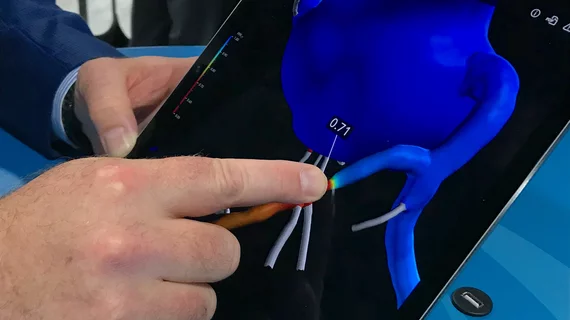AI-powered CCTA outperforms usual care when evaluating stable chest pain
Applying advanced artificial intelligence algorithms to coronary CT angiography (CCTA) provides significant value when evaluating patients with stable chest pain and suspected coronary artery disease (CAD), according to a late-breaking clinical trial presented at the American Heart Association’s Scientific Sessions 2022 conference in Chicago.
The Prospective Randomized Trial of the Optimal Evaluation of Cardiac Symptoms and Revascularization (PRECISE) study was designed to evaluate HeartFlow’s AI-powered FFR-CT solution, which combines human analysis with AI to produce a 3D model of the patient’s heart. The American Heart Association and American College of Cardiology recognized the HeartFlow technology as a “reasonable,” “effective” treatment option for diagnosing CAD in their 2021 chest pain guidelines.
PRECISE included more than 2,000 adult patients who presented with stable chest pain and suspected CAD. Patients were evaluated in one of two ways: with a strategy focused on CCTA and FFR-CT or a more traditional strategy focused on stress testing and invasive coronary angiography (ICA).
The CCTA/FFR-CT strategy began with a risk score assessment aimed at determining if any further testing was necessary. Patients with lower scores—meaning they face an increased risk of heart disease—were then referred for CCTA with selective FFR-CT.
Overall, the use of CCTA and FFR-CT was associated with three key benefits compared to stress testing and ICA: improved accuracy, fewer unnecessary tests, and increased confidence. Risk scores determined that 20% of patients faced a minimal risk of heart disease, and nearly two-thirds of those patients did not require any follow-up testing.
Also, researchers noted, the CCTA/FFR-CT strategy was associated with higher rates of cholesterol and antiplatelet medications.
HeartFlow issued a prepared statement about these findings as soon as they were shared with the public.
“This is the strongest level of scientific evidence yet to support the approach professional guidelines recommend that physicians use to diagnose stable chest pain patients,” study chair Pamela Douglas, MD, the Ursula Geller Professor for Research in Cardiovascular Disease at Duke University School of Medicine, said in the statement. “Combining multiple steps into a precision pathway provides a clear path forward for clinicians.”
“We’re pleased to see these data support what the guidelines already recognize,” added Campbell Rogers, MD, HeartFlow’s chief medical officer. “We believe this level-one clinical science information will be used by more practitioners to guide decisions on how to optimize care for people with suspected coronary artery disease.”
Register for a free webinar about the PRECISE study
Cardiovascular Business is hosting a free educational webinar about these findings on Tuesday, Nov. 15. The webinar, "Insights from the PRECISE Trial 12-Month Data: Optimizing CAD Assessment for Improved Outcomes," begins at 2:30 ET. It is recommended for general cardiologists, interventional cardiologists, imaging specialists, cardiac surgeons, cardiovascular service line directors, administrators and others who like to keep up with the latest policy updates in healthcare.
Douglas, Maros Ferencik, MD, PhD, and Gregg Stone, MD will all be participating in the discussion and a live Q&A session. Click here to learn more about the webinar and register.


